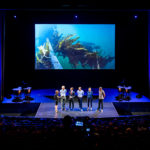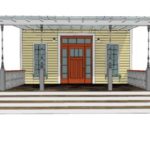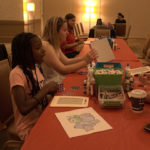
As a kindergarten choir belted out a shaky version of the National Anthem at a San Antonio community event, novice sign-language interpreter Barbie Parker struggled to keep up with their every word. “It was terrible,” she recalled, “inaudible, and I couldn’t remember all the words.” She signed as well as she could, but it was “pretty rough,” she said. More than 15 years later, Parker has perfected the art of sign-language interpretation, and signs at national music festivals like South by Southwest (SXSW) in Austin and Lollapalooza in Chicago — and she’s traded toddlers for big names like the White Stripes and Lady Gaga.
Parker began interpreting at conferences, workshops, and community events after taking American Sign Language (ASL) classes at San Antonio College, but she had never seen signing done well at large live-music events. “Deaf clients sometimes find musical interpreters overly excited by being close to the stage,” she said, “or awkward, trying to convey the sense of music through rhythm and dance.” When she began signing at music festivals, organizers received such good feedback from deaf attendees that they requested that Parker start a business. In 2007, she formed LotuSIGN, a company of talented sign-language interpreters specializing in live musical performances.
“LotuSIGN designed a complete strategy to provide musical interpretation and improve access,” Parker said. By “access,” she means that all deaf and hard-of-hearing attendees have the same powerful, emotional experience that hearing attendees have. “Unqualified interpreters can look as if they are interpreting the routine business of a city council meeting, rather than a fully inspired, affecting music experience,” she said. LotuSIGN interpreters don’t just sign the words, they reflect every emotion, every intonation — air guitars and all. “We are not your grandma’s ADA [Americans With Disabilities Act] provider,” Parker said. “We can meet the intensity and energy of any show on earth.”
And that requires preparation. For the 25 performances they signed at this year’s Lollapalooza, LotuSIGN interpreters began holding production meetings six months out, studying the music of the artists on the lineup. At major shows, the interpreters receive the final set lists one to two weeks ahead of show time.
Interpreters are positioned at the event on a platform or on stage where deaf and hard-of-hearing attendees in designated areas can easily see them. Fans in those areas are swelling in number. “When we began, there were one or two [deaf or hard-of-hearing] audience members,” Parker said. “Now the numbers range from 40 to 100-plus per event.” No doubt that’s due to a much- improved experience. “I enjoy greatly the times when the deaf audience is fist-pumping, dancing, crying, screaming, feeling sexy, singing (signing) along with the whole crowd,” she said. “When the lovers serenade each other in our section, those are good times.”



